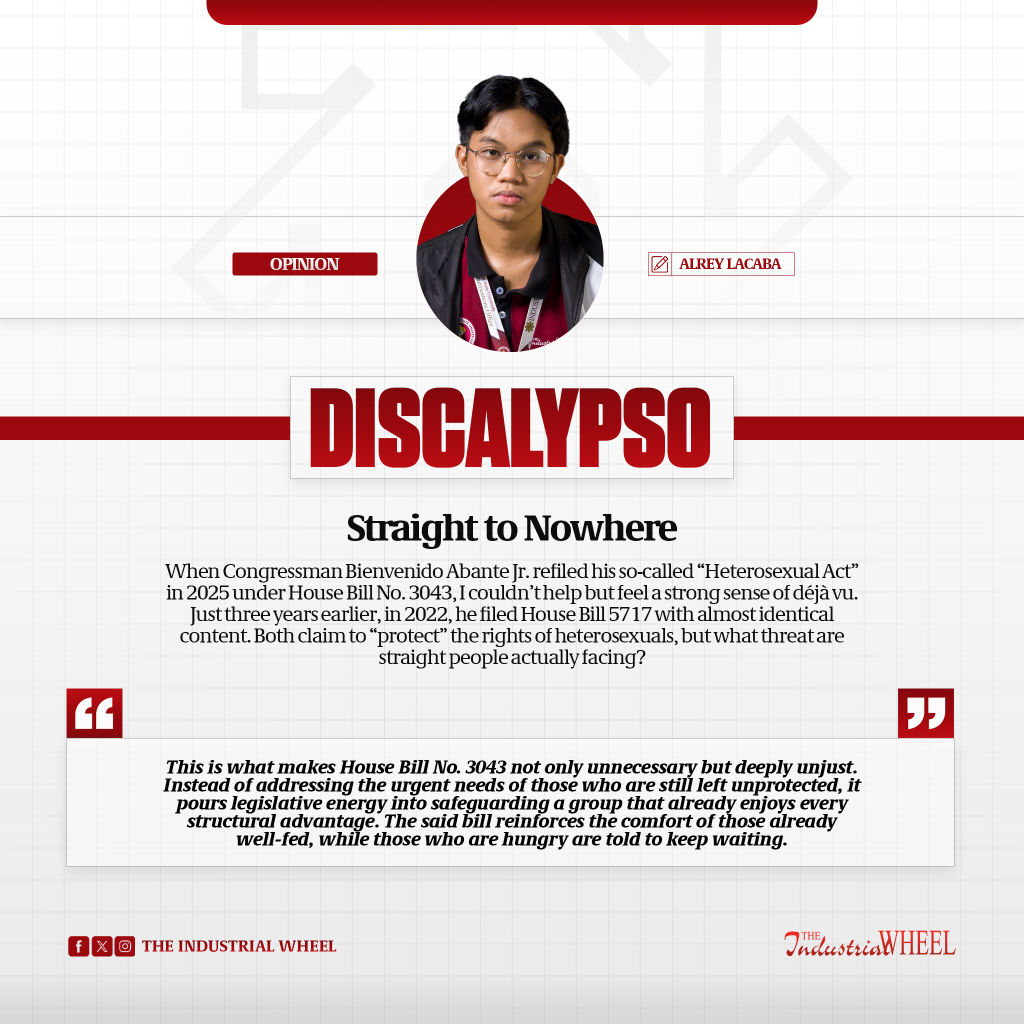
When Congressman Bienvenido Abante Jr. refiled his so-called “Heterosexual Act” in 2025 under House Bill No. 3043, I couldn’t help but feel a strong sense of déjà vu. Just three years earlier, in 2022, he filed House Bill 5717 with almost identical content. Both claim to “protect” the rights of heterosexuals, but what threat are straight people actually facing?
In a country where heterosexuals make up the overwhelming majority and hold every political, cultural, and legal privilege, this bill is not a shield. It is a second serving, while others are still waiting for their first plate. The Constitution and our laws already provide full protection for straight Filipinos as they can see themselves represented in politics, the media, and religion, they can marry the person they love, and they don’t have to think twice about holding hands in public. Their freedom to exist and freely express themselves has never been restricted. However, this bill portrays them as a marginalized minority that requires state protection.
A quick review of Section 3 of the bill clarifies this further. The so-called “rights of heterosexuals” it lists, freedom of religion, freedom of worship, and freedom of expression, are not new rights at all. They are already guaranteed to every Filipino by the Constitution. So what, then, is the purpose of codifying them again? Are these rights not already covered without the need for a special law? The House Bill No. 3043 only recycles protections heterosexuals already enjoy, presenting redundancy as if it were progress.
What is even more concerning is that the bill blurs the distinction between church and state by using biblical passages to support its claims. Although many Filipinos’ personal lives are greatly influenced by their faith, the laws of a pluralistic, secular democracy shouldn’t be governed by it. To be clear, this is not a call to dismiss faith, rather, it is a recognition that faith is sacred and private, and should never be imposed through laws. Because when religion becomes the backbone of law, it will risk legitimizing discrimination and excluding those who believe differently.
At its core, the “Heterosexual Act” mistakes privilege for oppression. Straight people are not silenced when they express their views, they are not denied services because of who they love, and they never had to wait decades just for recognition in law. But for LGBTQIA+ Filipinos, that’s still the reality – many still get bullied and harassed in schools, discriminated against in workplaces, or even judged when they try to access healthcare. And for over 20 years now, their demand for the SOGIESC Equality Bill, a bill that would simply provide them with basic protection, has been kept on hold in Congress. As a matter of fact, the SOGIESC Equality Bill is a bill for everyone, including the heterosexuals. It doesn’t take away anyone’s rights, it only ensures fairness for all.
This is what makes House Bill No. 3043 not only unnecessary but deeply unjust. Instead of addressing the urgent needs of those who are still left unprotected, it pours legislative energy into safeguarding a group that already enjoys every structural advantage. The said bill reinforces the comfort of those already well-fed, while those who are hungry are told to keep waiting.
If Congress is truly serious about justice, it should be setting more chairs at the table, not guarding the seats already reserved. Real equality means ensuring everyone has a place and a share, not reinforcing the dominance of those who already have the lion’s share. Passing laws that reassert majority privilege does nothing to strengthen our democracy, what strengthens it is protecting those who remain vulnerable.
Instead of wasting time on a dish nobody needs, our lawmakers should finally serve what the country has long been hungry for. A law that protects those left on the margins. The SOGIESC Equality Bill is a real meal worth preparing, one that can finally nourish fairness and dignity for all.
Column by Discalypso
